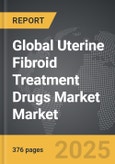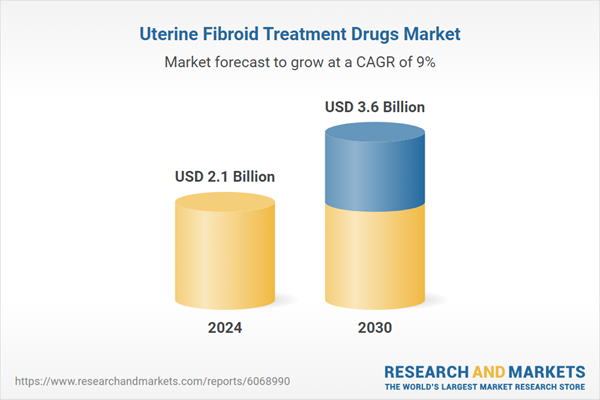Global Uterine Fibroid Treatment Drugs Market - Key Trends & Drivers Summarized
Is the Rising Prevalence of Uterine Fibroids Reshaping the Demand for Drug-Based Therapies?
Uterine fibroids, or leiomyomas, are one of the most common benign tumors in women of reproductive age, with an estimated global prevalence affecting nearly 20% to 40% of women. The rising awareness, improved diagnosis, and increased healthcare access have significantly boosted the number of women seeking treatment for fibroid-related symptoms such as heavy menstrual bleeding, pelvic pain, infertility, and anemia. As many patients look for alternatives to invasive surgical procedures such as hysterectomy and myomectomy, pharmaceutical interventions are gaining renewed traction. This shift in patient preference has significantly expanded the demand for uterine fibroid treatment drugs as first-line or pre-surgical management options. With fibroids more commonly affecting women in their 30s and 40s - many of whom are still in their childbearing years - preserving fertility and avoiding long recovery times has become a central concern, further propelling the need for effective, non-surgical therapies. Ethnic disparities particularly higher incidence and severity among women of African descent are also contributing to a growing patient pool in underserved and high-risk communities. These demographic and clinical dynamics are creating a robust foundation for sustained growth in the drug-based treatment segment for uterine fibroids.How Are Novel Drug Classes and Hormonal Agents Advancing Therapeutic Options?
Pharmaceutical innovation is rapidly transforming the landscape of uterine fibroid treatment, with new and improved drugs offering enhanced symptom control, fewer side effects, and greater convenience. Gonadotropin-releasing hormone (GnRH) analogs have long been used to reduce fibroid size and manage heavy bleeding, but their association with hypoestrogenic side effects like bone loss and hot flashes has limited long-term use. This has paved the way for newer therapies such as selective progesterone receptor modulators (SPRMs) and oral GnRH antagonists, which offer more targeted hormonal modulation with improved safety profiles. Drugs like relugolix, often used in combination with estradiol and norethindrone, are now emerging as effective oral therapies that balance efficacy with patient tolerability. These novel agents are enabling long-term symptom management and are increasingly being prescribed as alternatives or adjuncts to surgical intervention. In parallel, advancements in drug delivery mechanisms - such as extended-release formulations and combination therapies - are enhancing patient adherence and expanding options for individualized care. With ongoing clinical trials exploring new hormone regulators, anti-fibrotic agents, and even immune-modulating therapies, the pharmaceutical pipeline for uterine fibroid treatment is more dynamic than ever. These innovations are not only improving therapeutic outcomes but are also reinforcing the market's shift toward personalized, non-invasive fibroid management.Are Shifting Patient Preferences and Healthcare Models Driving Non-Surgical Treatment Adoption?
The growing global emphasis on patient-centered, minimally invasive care is fundamentally changing how uterine fibroids are managed - putting greater focus on drug-based interventions. Increasingly, women are demanding treatment options that allow them to preserve their uterus, maintain fertility, and avoid extended downtime associated with surgery. This has made pharmacological therapies an attractive choice, particularly for those with mild to moderate symptoms or those awaiting surgery. Moreover, the evolution of outpatient care models and the expansion of telemedicine platforms are facilitating remote diagnosis, follow-up, and prescription of fibroid treatment drugs, making therapies more accessible even in lower-resource settings. Direct-to-consumer health platforms and digital wellness brands are also playing a role in demystifying menstrual health and fibroid awareness, encouraging more women to pursue medical treatment earlier. Furthermore, the ability to combine drug therapy with other non-invasive procedures, such as uterine artery embolization (UAE) or focused ultrasound surgery (FUS), is giving patients and providers more flexibility in treatment planning. In response, pharmaceutical companies are increasingly focusing on education, patient support programs, and community outreach to encourage adherence and improve outcomes. This patient-driven momentum is contributing to a more diversified and inclusive market landscape, where drug therapies serve as both standalone solutions and components of broader multimodal treatment strategies.What Factors Are Driving Long-Term Growth in the Uterine Fibroid Treatment Drugs Market?
The growth in the uterine fibroid treatment drugs market is driven by a combination of clinical need, technological progress, changing patient demographics, and evolving healthcare delivery systems. A key driver is the increasing global prevalence of fibroids, particularly among women aged 30 to 50, a demographic that is highly active in seeking care and maintaining reproductive health. The expanding pipeline of targeted hormonal therapies, including SPRMs and oral GnRH antagonists, is providing safer, more convenient options for long-term management, thus drawing greater interest from both patients and providers. Healthcare systems around the world are also shifting toward non-surgical management of chronic conditions, creating a favorable environment for the adoption of drug-based fibroid therapies. Additionally, growing awareness campaigns and women's health advocacy efforts are improving education and reducing stigma around menstrual health, leading to earlier diagnosis and greater demand for pharmacologic solutions. Reimbursement approvals and regulatory endorsements in key markets like the U.S., Europe, and Japan are also bolstering product accessibility and commercial viability. Investment from major pharmaceutical companies and biotech startups alike is fueling research and development, while digital health platforms are enabling broader distribution and patient engagement. Together, these factors are ensuring that the uterine fibroid treatment drugs market continues to grow, driven by innovation, accessibility, and an increasingly empowered global patient population.Report Scope
The report analyzes the Uterine Fibroid Treatment Drugs market, presented in terms of market value (US$). The analysis covers the key segments and geographic regions outlined below:- Segments: Drug Class (Gonadotropin-releasing Hormone Agonists, Gonadotropin-releasing Hormone Antagonists, Progestin-releasing Intrauterine Device & Contraceptives, Non-hormonal Medications, Others); Type (Subserosal Fibroids, Intramural Fibroids, Submucosal Fibroids, Pedunculated Fibroids); End-User (Hospital Pharmacies, Retail Pharmacies, Others).
- Geographic Regions/Countries: World; United States; Canada; Japan; China; Europe (France; Germany; Italy; United Kingdom; Spain; Russia; and Rest of Europe); Asia-Pacific (Australia; India; South Korea; and Rest of Asia-Pacific); Latin America (Argentina; Brazil; Mexico; and Rest of Latin America); Middle East (Iran; Israel; Saudi Arabia; United Arab Emirates; and Rest of Middle East); and Africa.
Key Insights:
- Market Growth: Understand the significant growth trajectory of the Gonadotropin-releasing Hormone Agonists segment, which is expected to reach US$1.4 Billion by 2030 with a CAGR of a 10.4%. The Gonadotropin-releasing Hormone Antagonists segment is also set to grow at 6.8% CAGR over the analysis period.
- Regional Analysis: Gain insights into the U.S. market, valued at $577.7 Million in 2024, and China, forecasted to grow at an impressive 14.2% CAGR to reach $789.3 Million by 2030. Discover growth trends in other key regions, including Japan, Canada, Germany, and the Asia-Pacific.
Why You Should Buy This Report:
- Detailed Market Analysis: Access a thorough analysis of the Global Uterine Fibroid Treatment Drugs Market, covering all major geographic regions and market segments.
- Competitive Insights: Get an overview of the competitive landscape, including the market presence of major players across different geographies.
- Future Trends and Drivers: Understand the key trends and drivers shaping the future of the Global Uterine Fibroid Treatment Drugs Market.
- Actionable Insights: Benefit from actionable insights that can help you identify new revenue opportunities and make strategic business decisions.
Key Questions Answered:
- How is the Global Uterine Fibroid Treatment Drugs Market expected to evolve by 2030?
- What are the main drivers and restraints affecting the market?
- Which market segments will grow the most over the forecast period?
- How will market shares for different regions and segments change by 2030?
- Who are the leading players in the market, and what are their prospects?
Report Features:
- Comprehensive Market Data: Independent analysis of annual sales and market forecasts in US$ Million from 2024 to 2030.
- In-Depth Regional Analysis: Detailed insights into key markets, including the U.S., China, Japan, Canada, Europe, Asia-Pacific, Latin America, Middle East, and Africa.
- Company Profiles: Coverage of players such as AngioDynamics, Applied Medical, Argon Medical Devices, Inc., Astellas Pharma Inc., B. Braun Melsungen AG and more.
- Complimentary Updates: Receive free report updates for one year to keep you informed of the latest market developments.
Some of the 34 companies featured in this Uterine Fibroid Treatment Drugs market report include:
- AbbVie Inc.
- Abbott Healthcare Pvt. Ltd.
- Amring Pharmaceuticals Inc.
- AstraZeneca
- Bayer AG
- Biocon Biologics
- Bristol-Myers Squibb Company
- Ferring Pharmaceuticals
- Gedeon Richter plc
- GlaxoSmithKline plc
- Hologic, Inc.
- Hoffmann-La Roche Ltd
- Ipsen Pharma
- Kissei Pharmaceutical Co., Ltd.
- Medtronic
- Merot Medical Systems
- Minerva Surgical, Inc.
- Myovant Sciences GmbH
- Novartis AG
- ObsEva
This edition integrates the latest global trade and economic shifts into comprehensive market analysis. Key updates include:
- Tariff and Trade Impact: Insights into global tariff negotiations across 180+ countries, with analysis of supply chain turbulence, sourcing disruptions, and geographic realignment. Special focus on 2025 as a pivotal year for trade tensions, including updated perspectives on the Trump-era tariffs.
- Adjusted Forecasts and Analytics: Revised global and regional market forecasts through 2030, incorporating tariff effects, economic uncertainty, and structural changes in globalization. Includes historical analysis from 2015 to 2023.
- Strategic Market Dynamics: Evaluation of revised market prospects, regional outlooks, and key economic indicators such as population and urbanization trends.
- Innovation & Technology Trends: Latest developments in product and process innovation, emerging technologies, and key industry drivers shaping the competitive landscape.
- Competitive Intelligence: Updated global market share estimates for 2025, competitive positioning of major players (Strong/Active/Niche/Trivial), and refined focus on leading global brands and core players.
- Expert Insight & Commentary: Strategic analysis from economists, trade experts, and domain specialists to contextualize market shifts and identify emerging opportunities.
Table of Contents
Companies Mentioned (Partial List)
A selection of companies mentioned in this report includes, but is not limited to:
- AbbVie Inc.
- Abbott Healthcare Pvt. Ltd.
- Amring Pharmaceuticals Inc.
- AstraZeneca
- Bayer AG
- Biocon Biologics
- Bristol-Myers Squibb Company
- Ferring Pharmaceuticals
- Gedeon Richter plc
- GlaxoSmithKline plc
- Hologic, Inc.
- Hoffmann-La Roche Ltd
- Ipsen Pharma
- Kissei Pharmaceutical Co., Ltd.
- Medtronic
- Merot Medical Systems
- Minerva Surgical, Inc.
- Myovant Sciences GmbH
- Novartis AG
- ObsEva
Table Information
| Report Attribute | Details |
|---|---|
| No. of Pages | 376 |
| Published | February 2026 |
| Forecast Period | 2024 - 2030 |
| Estimated Market Value ( USD | $ 2.1 Billion |
| Forecasted Market Value ( USD | $ 3.6 Billion |
| Compound Annual Growth Rate | 9.0% |
| Regions Covered | Global |









